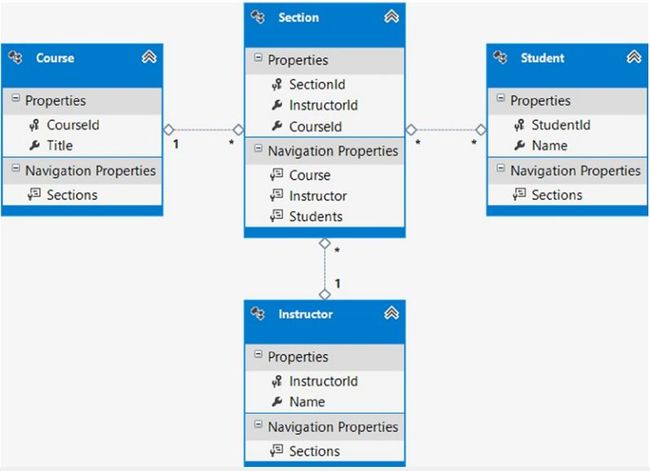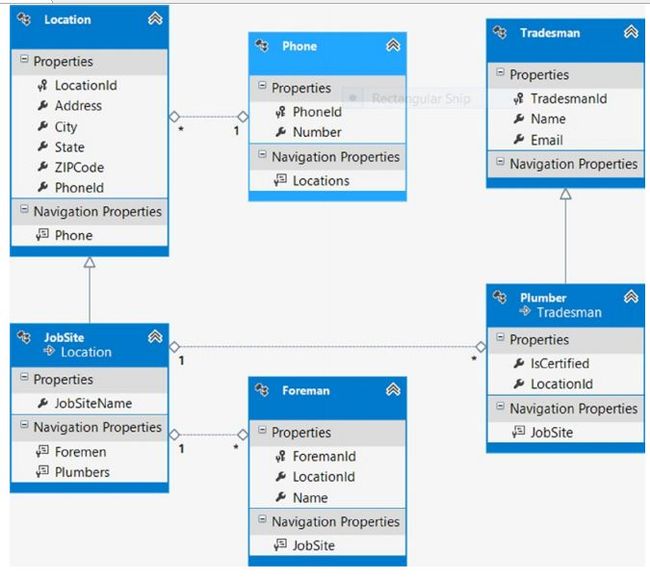《Entity Framework 6 Recipes》中文翻译系列 (25) ------ 第五章 加载实体和导航属性之加载完整的对象图和派生类型上的导航属性
翻译的初衷以及为什么选择《Entity Framework 6 Recipes》来学习,请看本系列开篇
5-5 加载完整的对象图
问题
你有一个包含许多关联实体的模型,你想在一次查询中,加载完整的对象图实例。一般地,当一个页面视图需要呈现关联实体集时,你会选择这种方法,而不是延迟加载,因为延迟加载是通过一系列的短小查询来获取关联实体的。
解决方案
假设你有如图5-20所示的概念模型。每门课程有很多节,每一节由一个老师教多名学生。
图5-20 一个包含许多关联实体的模型
使用Include()方法和查询路径参数,通过一个查询,从数据库中获取所有的课程,课时,老师和学生,如代码清单5-12所示。
1 using (var context = new EFRecipesEntities()) 2 { 3 var course = new Course {Title = "Biology 101"}; 4 var fred = new Instructor {Name = "Fred Jones"}; 5 var julia = new Instructor {Name = "Julia Canfield"}; 6 var section1 = new Section {Course = course, Instructor = fred}; 7 var section2 = new Section {Course = course, Instructor = julia}; 8 9 var jim = new Student {Name = "Jim Roberts"}; 10 jim.Sections.Add(section1); 11 12 var jerry = new Student {Name = "Jerry Jones"}; 13 jerry.Sections.Add(section2); 14 15 var susan = new Student {Name = "Susan O'Reilly"}; 16 susan.Sections.Add(section1); 17 18 var cathy = new Student {Name = "Cathy Ryan"}; 19 cathy.Sections.Add(section2); 20 21 course.Sections.Add(section1); 22 course.Sections.Add(section2); 23 24 context.Students.Add(jim); 25 context.Students.Add(jerry); 26 context.Students.Add(susan); 27 context.Students.Add(cathy); 28 29 context.Courses.Add(course); 30 context.SaveChanges(); 31 } 32 33 //字符串查询路径参数 34 using (var context = new EFRecipesEntities()) 35 { 36 var graph = context.Courses 37 .Include("Sections.Instructor") 38 .Include("Sections.Students"); 39 Console.WriteLine("Courses"); 40 Console.WriteLine("======="); 41 42 foreach (var course in graph) 43 { 44 Console.WriteLine("{0}", course.Title); 45 foreach (var section in course.Sections) 46 { 47 Console.WriteLine("\tSection: {0}, Instrutor: {1}", section.SectionId, section.Instructor.Name); 48 Console.WriteLine("\tStudents:"); 49 foreach (var student in section.Students) 50 { 51 Console.WriteLine("\t\t{0}", student.Name); 52 } 53 Console.WriteLine("\n"); 54 } 55 } 56 } 57 58 // 强类型查询路径参数 59 using (var context = new EFRecipesEntities()) 60 { 61 var graph = context.Courses 62 .Include(x => x.Sections.Select(y => y.Instructor)) 63 .Include(x => x.Sections.Select(z => z.Students)); 64 65 Console.WriteLine("Courses"); 66 Console.WriteLine("======="); 67 68 foreach (var course in graph) 69 { 70 Console.WriteLine("{0}", course.Title); 71 foreach (var section in course.Sections) 72 { 73 Console.WriteLine("\tSection: {0}, Instrutor: {1}", section.SectionId, section.Instructor.Name); 74 Console.WriteLine("\tStudents:"); 75 foreach (var student in section.Students) 76 { 77 Console.WriteLine("\t\t{0}", student.Name); 78 } 79 Console.WriteLine("\n"); 80 } 81 } 82 } 83 84 Console.WriteLine("Press <enter> to continue..."); 85 Console.ReadLine();
代码清单5-12的输出如下:
Courses Courses ======= Biology 101 Section: 19, Instructor: Fred Jones Students: Jim Roberts Susan O'Reilly Section: 20, Instructor: Julia Canfield Students: Jerry Jones Cathy Ryan
原理
分别给Include()方法传递字符串和强类型形式的查询路径参数。查询路径代表我们想使用Include()方法加载的整个对象图路径。Include()方法,扩展查询包含查询路径中指定的实体对象。
在代码清单5-12中,我们最先演示基于字符串形式参数的Include()方法。Include()方法第一次调用,通过表示对象图部分对象的查询路径将Secion扩展至Instructor。这使得查询包含了所有的课时(Sections)和它们的教师(Instructors)。然后在第一个Include()方法后链接另一个Include()方法,它包含一个将Secton扩展到Student的查询路径,这将使得查询包含所有课时(Sections)和它们的学生(Students)。最终结果就是,实例化了一个完整的对象图,它包含所有的Course实体和在模型中每个与它关联的实体。
在代码的第二部分,我们演示了使用强类型查询路径参数的Include()方法,注意这两个Include()方法是如何结合一个参数,x.Sections,并使用Select()方法整合关联实体Instructor和Students的。
注意 接受强类型参数的重载方法Include(),是在命名空间System.Data.Entity中公布的扩展方法。要使用这个方法,你需要在你的类中使用using引用这个命名空间。
你可以使用导航属性构造任何深度的查询路径,这给你加载部分或是完整的对象图带来很大的灵活性。实体框架会通过修剪掉重叠和重复的查询路径来优化查询。
Include()方法的语法和主义都看似简单。但不要被这种简单迷惑了,以为使用Include()方法是不需要付出性能代价的。调用多个Includ()方法预先加载数据,会迅速地增加生成的SQL语句的复杂性,同时,从数据库中返回的数据量也急剧上升。复杂的查询语句会导致产生低性能的查询计划,大数据量的返回,也会让实体框架花费大量的时间来移除重复的数据。所以你应该明智地使用Include()方法,确保它不会给你的应用带来潜在的性能问题。
5-6 加载派生类型上的导航属性
问题
你有这样一个模型,有一个或多个派生类,它们在一个或多个实体的Has-a关系中(一个对象是另一个对象的一部分)。你想在一次数据库交互中预先加载所有关联的实体。
解决方案
假设你有如图5-21所示的模型。
图5-21 一个包含 Plumbers(管道工人)、他们的JobSite(工作场所)和其它关联实体的模型
在模型中,管道工人(Plumber)实体继承至手艺人(Tradesman)实体,一个管道工人(Plumber)有一个工作场所(JobSite),这是通过一个一对多关联表示的。工作场所(JobSite)类型继承至地点(Location)实体。Location有一个Phone,这是通过一个一对多关联表示的。最后,一个JobSite可能拥有0或者多个工头(Formen),也是通过一个一对多关联表示的。
假设你想获取一个管道工人,他的工作场所,工作场所的电话,以及工作场所全部的工头。你想在一次数据库交互中返回这些数据。
代码清单5-13演示,在一个查询中通过使用Includ()方法预先加载关联实体。
代码清单5-13.使用Include()方法在一次数据库交互中预先加载关联实体
1 using (var context = new EFRecipesEntities()) 2 { 3 var foreman1 = new Foreman {Name = "Carl Ramsey"}; 4 var foreman2 = new Foreman {Name = "Nancy Ortega"}; 5 var phone = new Phone {Number = "817 867-5309"}; 6 var jobsite = new JobSite 7 { 8 JobSiteName = "City Arena", 9 Address = "123 Main", 10 City = "Anytown", 11 State = "TX", 12 ZIPCode = "76082", 13 Phone = phone 14 }; 15 jobsite.Foremen.Add(foreman1); 16 jobsite.Foremen.Add(foreman2); 17 var plumber = new Plumber {Name = "Jill Nichols", Email = "[email protected]", JobSite = jobsite}; 18 context.Tradesmen.Add(plumber); 19 context.SaveChanges(); 20 } 21 22 using (var context = new EFRecipesEntities()) 23 { 24 var plumber = 25 context.Tradesmen.OfType<Plumber>().Include("JobSite.Phone").Include("JobSite.Foremen").First(); 26 Console.WriteLine("Plumber's Name: {0} ({1})", plumber.Name, plumber.Email); 27 Console.WriteLine("Job Site: {0}", plumber.JobSite.JobSiteName); 28 Console.WriteLine("Job Site Phone: {0}", plumber.JobSite.Phone.Number); 29 Console.WriteLine("Job Site Foremen:"); 30 foreach (var boss in plumber.JobSite.Foremen) 31 { 32 Console.WriteLine("\t{0}", boss.Name); 33 } 34 } 35 36 Console.WriteLine("Press <enter> to continue..."); 37 Console.ReadLine();
代码清单5-13的输出如下:
Plumber's Name: Jill Job Site: City Arena Job Site Phone: 817 8 Job Site Foremen: Carl Ramsey Nancy Ortega
原理
我们的查询以获取派生类型Plumber开始,为了获取它们,我们使用了OfType<Plumber>()方法,OfType<>()方法,从实体集中获取给定子类型的实例。
我们想从Plumber中加载与之关联的实体JobSite和与JobSite关联的实体Phone。注意JobSite实体并没有导航属性Phone。但是JobSite派生至Location,Location有导航属性Phone。因为Phone是基类属性,所以派生类同样能使用,这就是使用继承的好处。它使查询路径可以简单地表示为:JobSite.Phone。
然后,我再次使用查询路径和Include()方法,从JobSite实体中获取Foreman实体.JobSite和Foreman有一个一对多关联。注意导航属性的复数形式(从Foreman变成Foremen)。
最后,我们使用First()方法选择第一个Plumber实体,这样将返回一个Plumber类型,而不是一个Plumber对象集合。
生成的查询有点复杂,涉及了几个Join连接和子查询。与此对应的,使用延迟加载,将会需要多次数据库交互,这样会带来性能损失。特别是加载多个Plumbers时。
实体框架交流QQ群: 458326058,欢迎有兴趣的朋友加入一起交流
谢谢大家的持续关注,我的博客地址:http://www.cnblogs.com/VolcanoCloud/

